Let’s make Tomato Basil Ade – a refreshing drink you can only find in Korean cafes!
It’s super easy to make at home, but today I’m going to show you how to recreate that authentic Korean cafe flavor in your own kitchen.
Table of Contents
What is Tomato Basil Ade?
Let’s make Tomato Ade – Korean cafes offer seasonal menus, and one of the most popular summer drinks is this tomato ade. It’s made with tomato basil cheong 청 (tomato basil syrup) mixed with basil, sparkling water and ice. The tomato adds a sweet and tangy flavor, and the basil adds a refreshing herbal aroma, making it a perfect Korean summer drink.

When you order lemonade in the U.S., you usually get lemon juice without carbonation. But in Korea, lemonade is made with sparkling water or Sprite. That’s the main difference between Western-style ade and Korean-style ade.
Tomato basil ade is still relatively unknown in many countries and is mostly found in Korea. But if you can’t make it to Korea, don’t worry – you can easily recreate this taste at home today! refreshing drink you can only find in Korean cafes! It’s super easy to make at home, but today I’m going to show you how to recreate homemade tomato syrup that authentic Korean cafe flavor in your own kitchen.
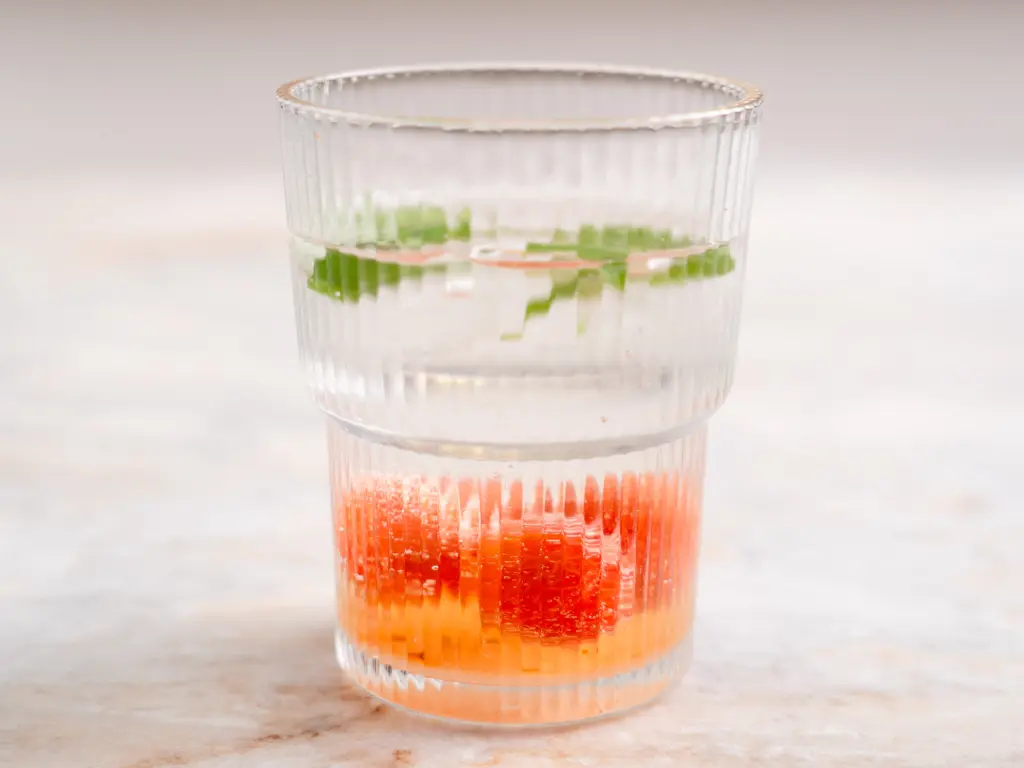
A Sweet Tomato Drink?
In the West, tomato juice is often savory—think Bloody Mary. But in Korea, people enjoy sweet tomato juice. That’s probably the biggest difference. Korean tomato drinks are made with plenty of sugar, not salt.
What is Tomato Basil Ade Made of?
- Cherry tomatoes
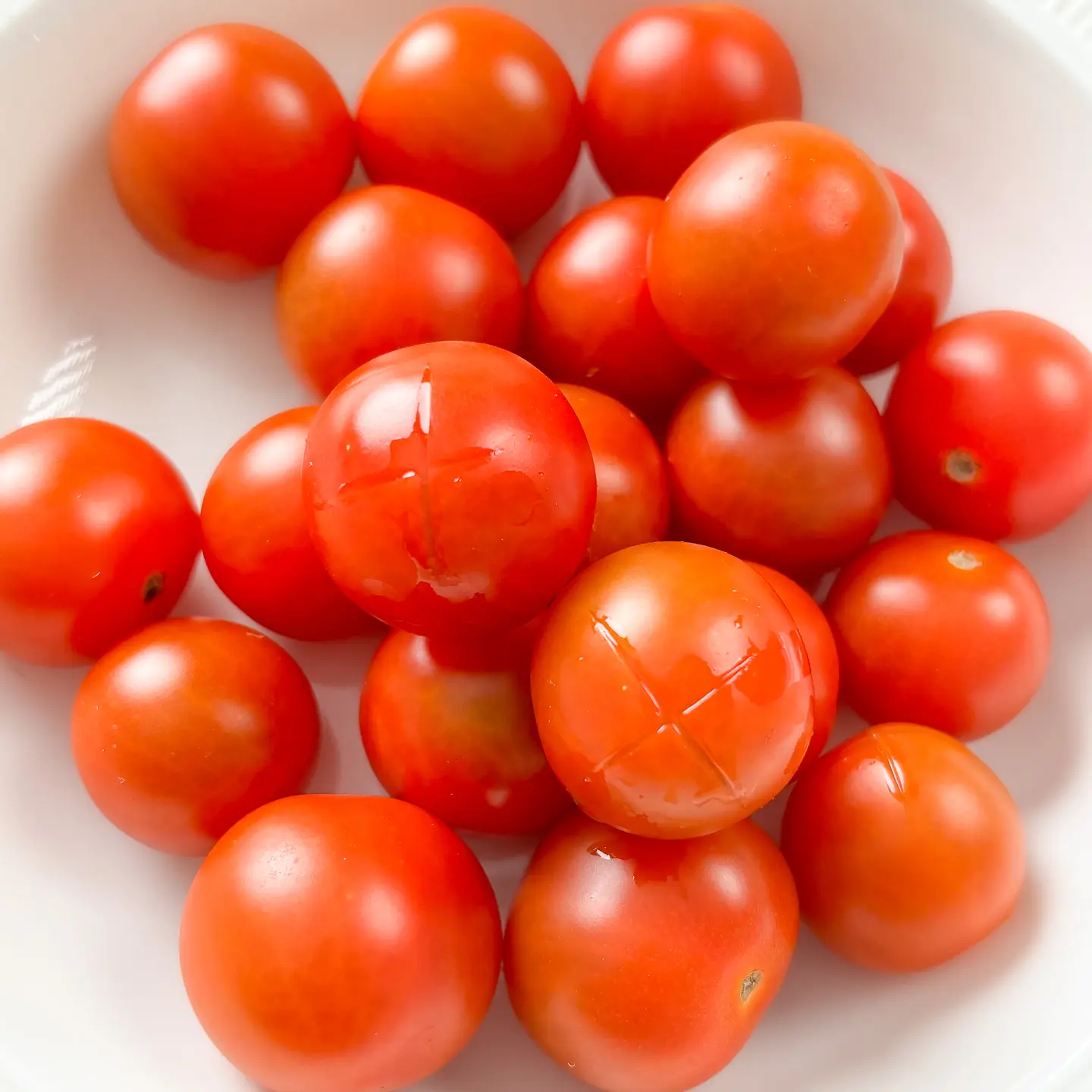
- Sugar
- Basil – Basil adds a fresh herbal aroma that makes this ade feel extra special.
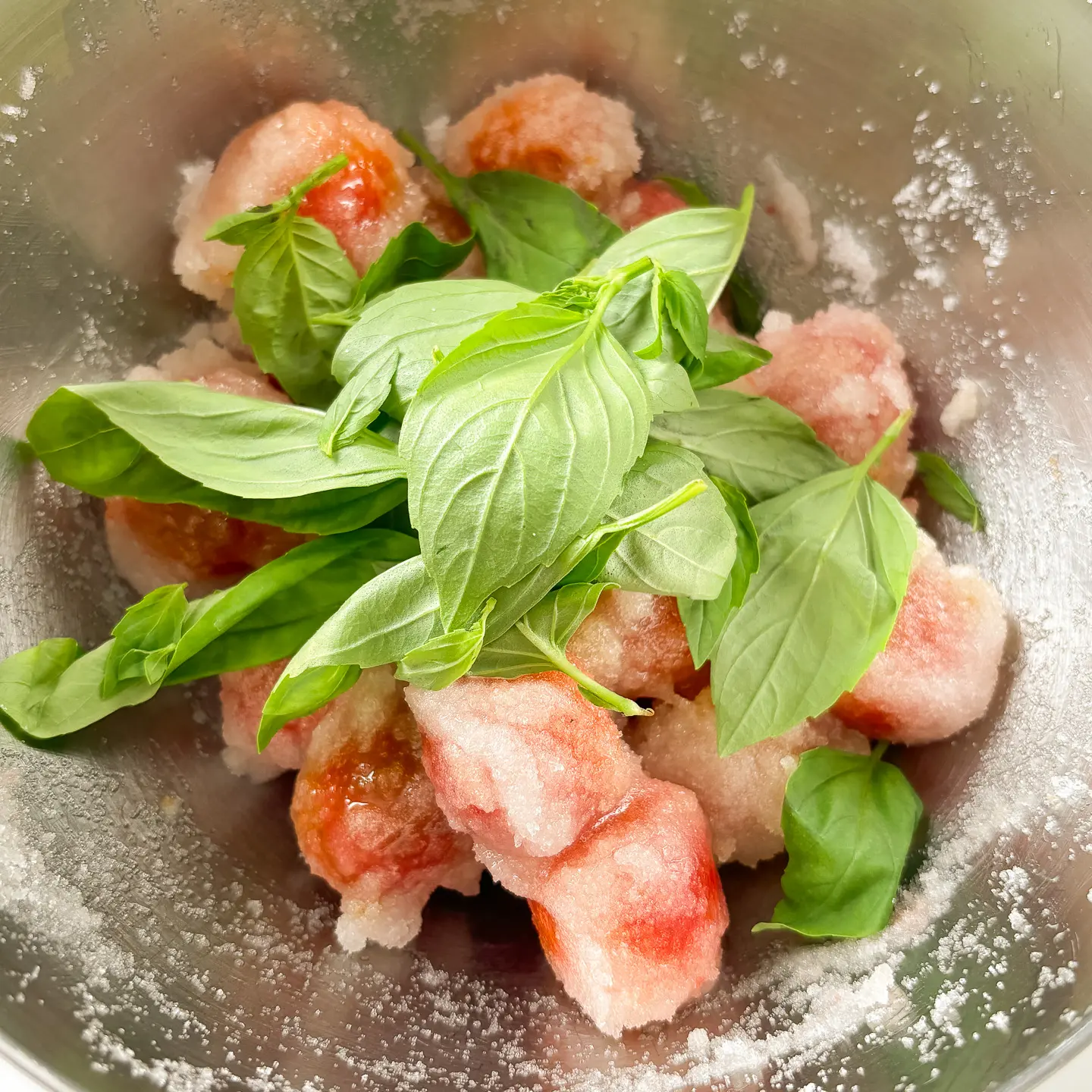
- Lemon juice – The lemon juice brings a bright acidity that makes the ade more fragrant and delicious.
Korean-Style Syrup – Cheong 청
In Korea, there are many kinds of fruit syrups called cheong. Cheong is a syrup made by preserving fruit in sugar. One of the most common examples is maesil cheong (green plum syrup), which is widely used in Korean cooking. It can be mixed with water to make a refreshing drink, but it’s also often added to dishes to remove unwanted odors from meat, add sweetness, and provide a pleasant aroma.
Besides maesil cheong, there are many other types of cheong in Korea. Traditional examples include yuja cheong (used in yuja tea) and saenggang cheong (used in ginger tea). These days, trendy cafés also make a variety of fruit cheong like tomato basil cheong. Other popular ones include strawberry cheong and tangerine cheong.
Let’s take a look at some popular Korean café menu items made with fruit cheong.
Unique Korean Café Ades
Korean cafés offer more than just simple lemonade—you can find a wide variety of creative and refreshing ades. Let’s explore some of the unique ades you’ll commonly see at Korean cafés.
- Strawberry Ade – Made with strawberry cheong (strawberries preserved in sugar), mixed with sparkling water and ice. Some cafés make their own syrup with fresh strawberries, while more affordable places may use artificial strawberry-flavored syrup with no real fruit.

- Green Grape Ade – Green grapes are cut in half and mixed with sugar to make green grape cheong. Cafés serve this with sparkling water. Just like with strawberry ade, some cafés use artificial green grape syrup, while the better ones use real green grape cheong—and the taste difference is huge.
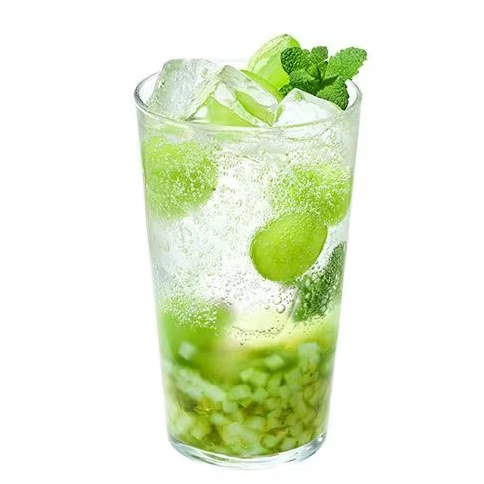
- Peach Ade – Made with peeled and diced peaches that are preserved in sugar to create peach cheong. This ade is sweet, fragrant, and often contains small chunks of real peach, making it especially popular in the summer.
You can even find these ades at Korean convenience stores. However, convenience store versions usually contain flavored syrup rather than real fruit cheong.
How to Avoid Failing?
1. Use a 1:1 ratio of sugar to fruit. Don’t reduce the sugar. If you cut back on sugar to make it “healthier,” mold can grow in the syrup.
2. Don’t boil the fruit too long. Just blanch it for 10 seconds. This helps preserve the nutrients while making it easy to peel the skin.
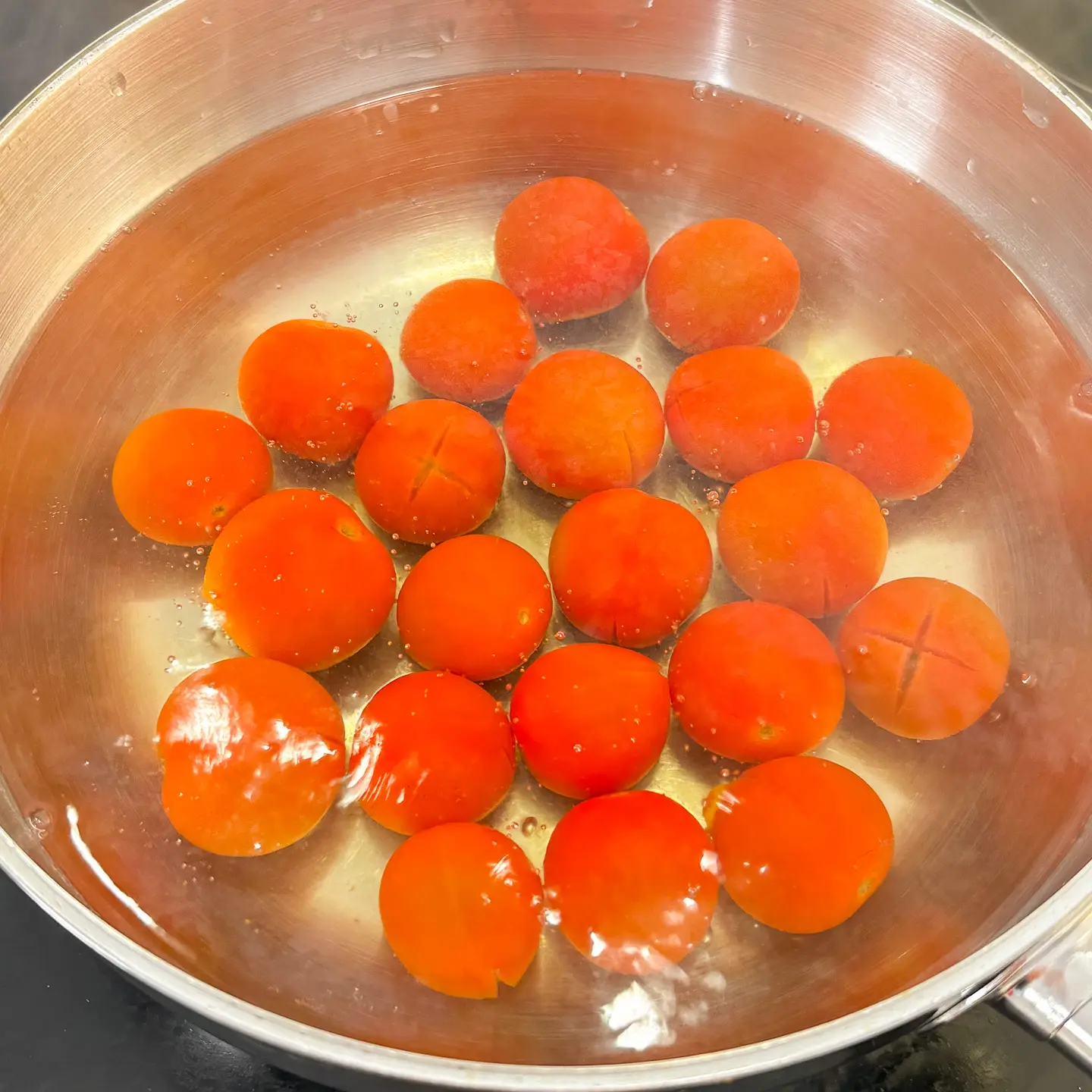
Sterilizing Glass Jars
When making fruit cheong, it’s essential to sterilize the glass jar you’ll use for storage. Since you’ll be keeping the syrup for a long time—like jam or sauce—you need to prevent mold from growing.
Fill a pot with about one-third water and place the clean jars upside down in the pot. Once the water reaches a full boil, continue boiling for 5 more minutes. Then reduce to medium heat and boil for another 10 minutes. Carefully remove the jars with rubber gloves and let them dry completely.
Tomato Ade Fermentation Time
Let the syrup sit at room temperature for one day. After that, stir it to mix any sugar that has settled, then store it in the refrigerator.
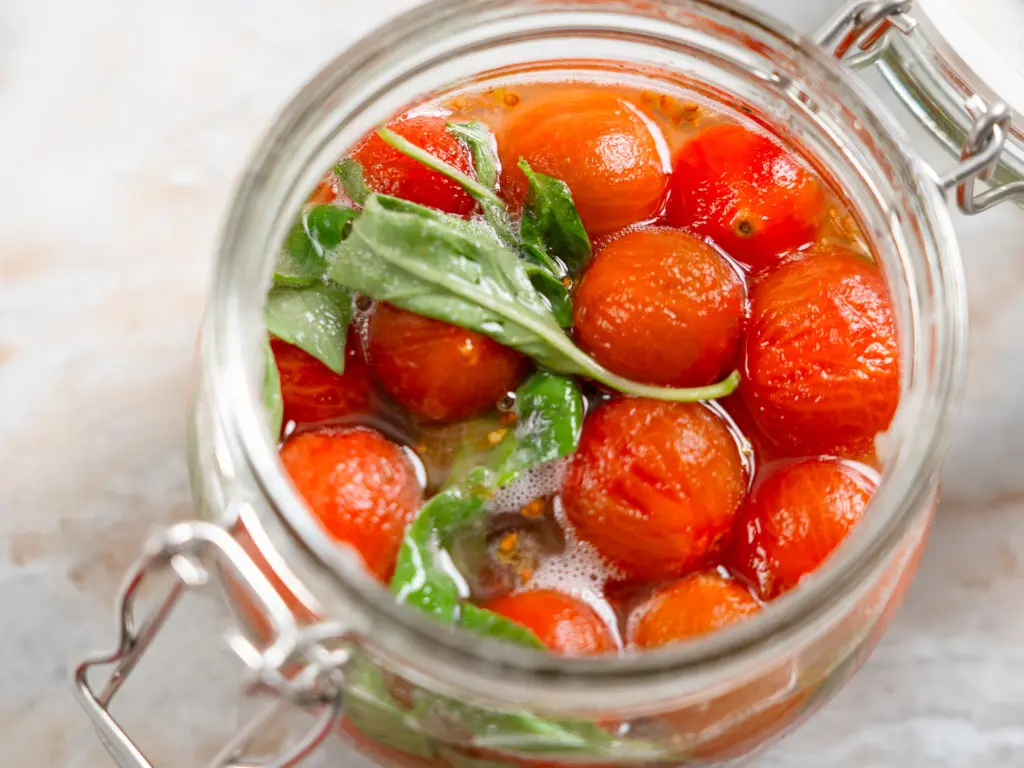
Shelf Life
It tastes best within 3 to 4 days. It’s recommended to consume it within a week.
Want to Make It Healthier?
You can use stevia instead of sugar to make a low-sugar(zero sugar) Tomato Basil Cheong. Since stevia is much sweeter than sugar, be sure to adjust the amount. Also, shorten the fermentation time compared to using regular sugar.
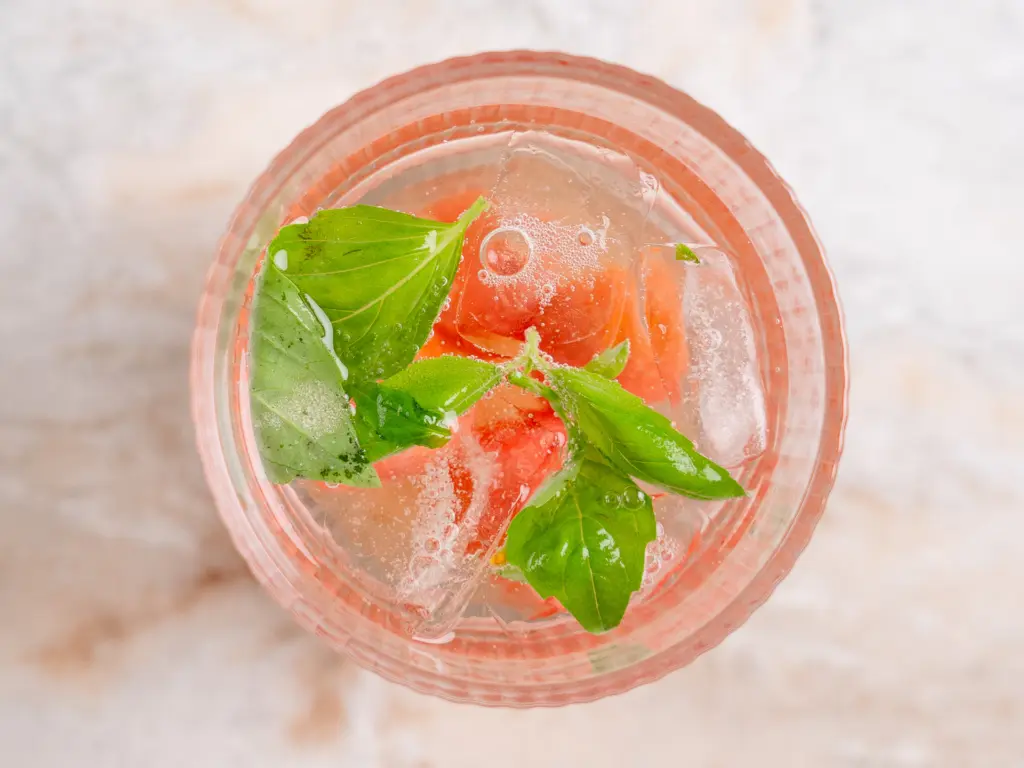
Perfect Dessert Pairings
Tomato ade goes well with almost any dessert, but Koreans often enjoy it with cake.
It pairs especially well with fruity desserts like fruit tarts, tangy lemon cake, strawberry cake, or mango cake.
To be honest, it tastes great with just about anything—this refreshing ade complements all kinds of treats.
Perfect Food Pairings
You don’t have to pair it only with dessert. Tomato ade will cool down your spicy tongue when eating something hot. Try it today with this Cheese Dakgalbi — this is the best recipe that tastes just like the Cheese Dakgalbi served at restaurants in Seoul.

Get Ingredients
- Jar: https://amzn.to/4cB2rmt (US), https://amzn.to/3EsUEe4 (NL, BE), https://amzn.to/42wF4G5 (UK), https://amzn.to/42Dol43 (DE)
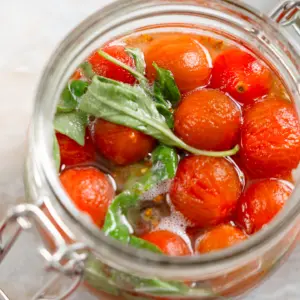
Easy Tomato Basil Ade – Korean Cafe Menu
Equipment
- 1 jar
- 1 small knife
- 1 Pot
- 1 Spoon
- 1 Bowl
Ingredients
- 250 g cherry tomatoes
- 250 g sugar
- 5 g fresh basil
- 2 tbsp lemon juice
Instructions
- Remove the stems from the cherry tomatoes and score an X on the bottom of each.
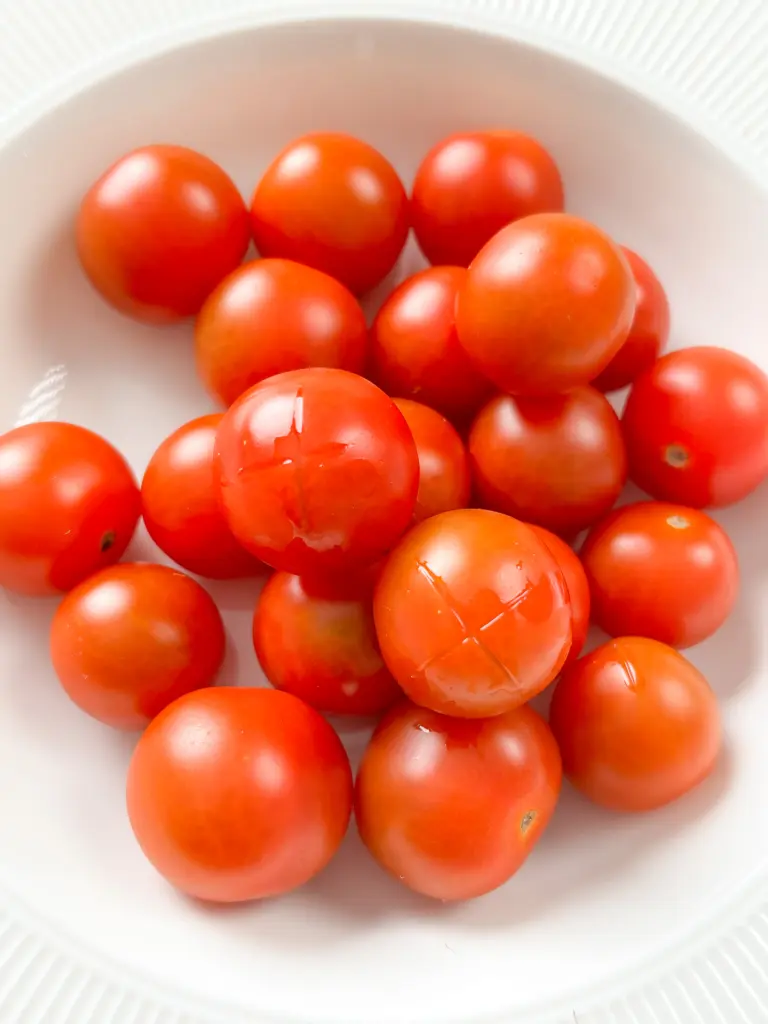
- Blanch the tomatoes in boiling water for 10 seconds.
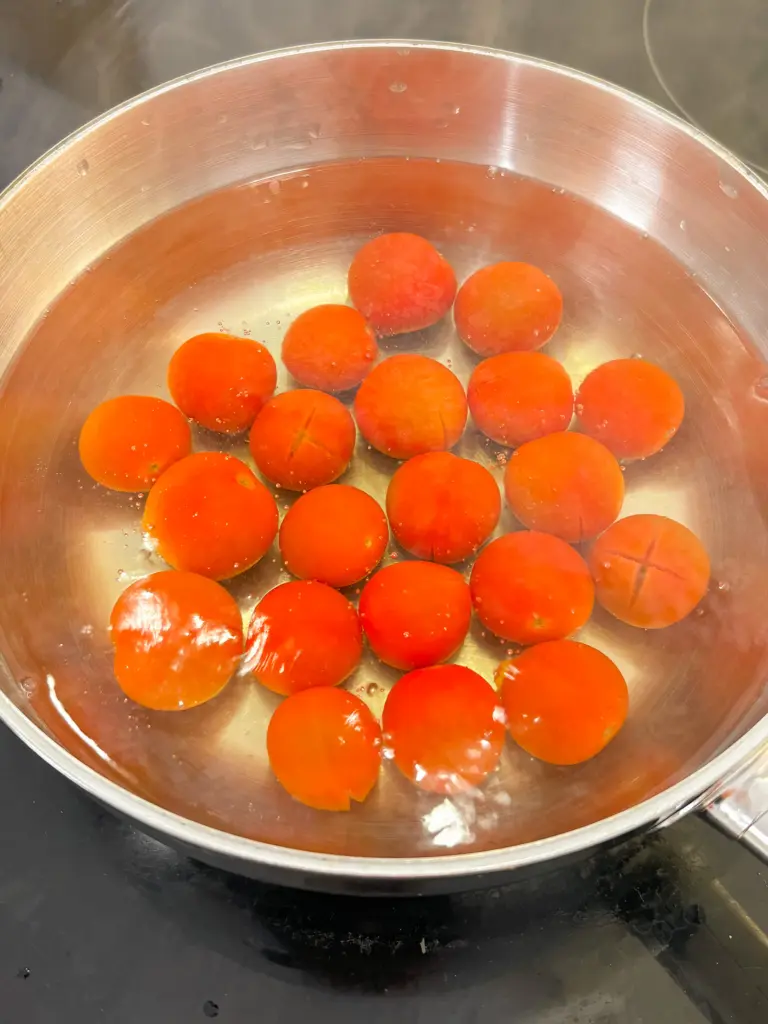
- Transfer them to cold water, then peel off the skins.
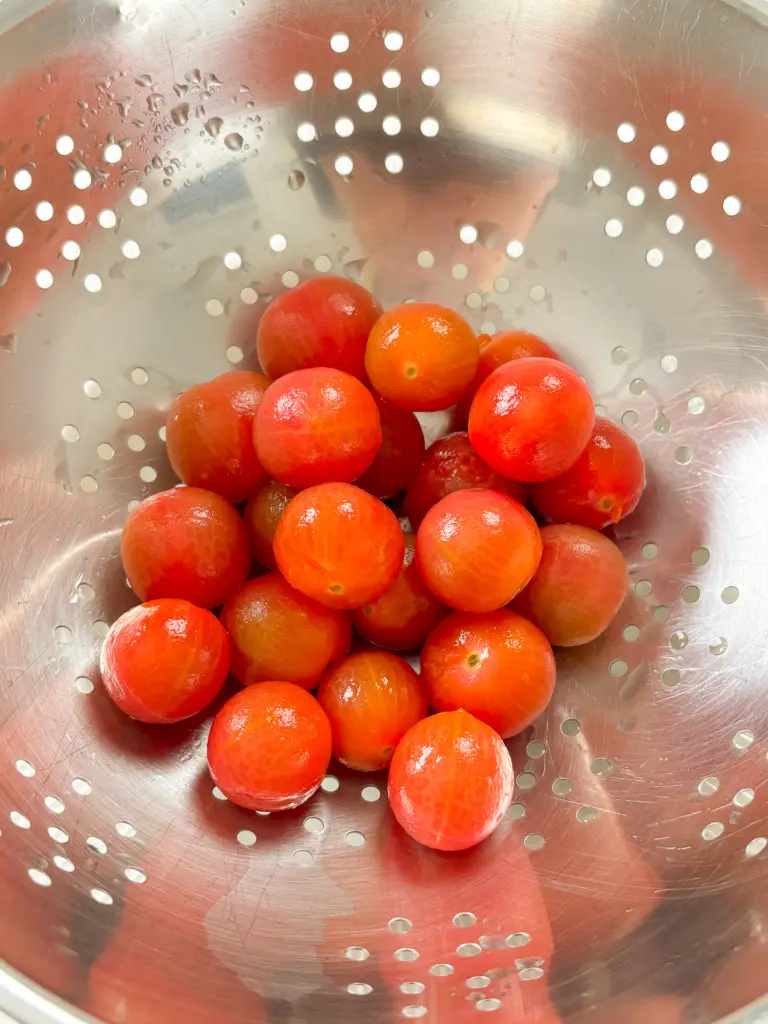
- Mix the peeled tomatoes with sugar and lemon juice in a bowl.
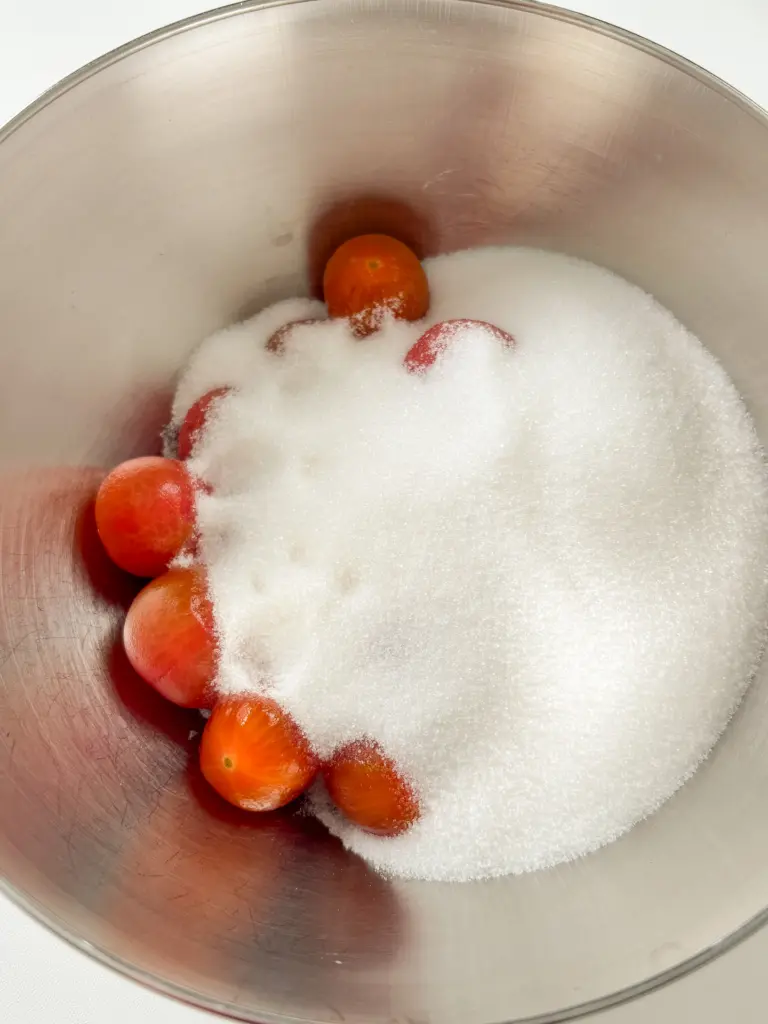
- Add fresh basil leaves and mix well.
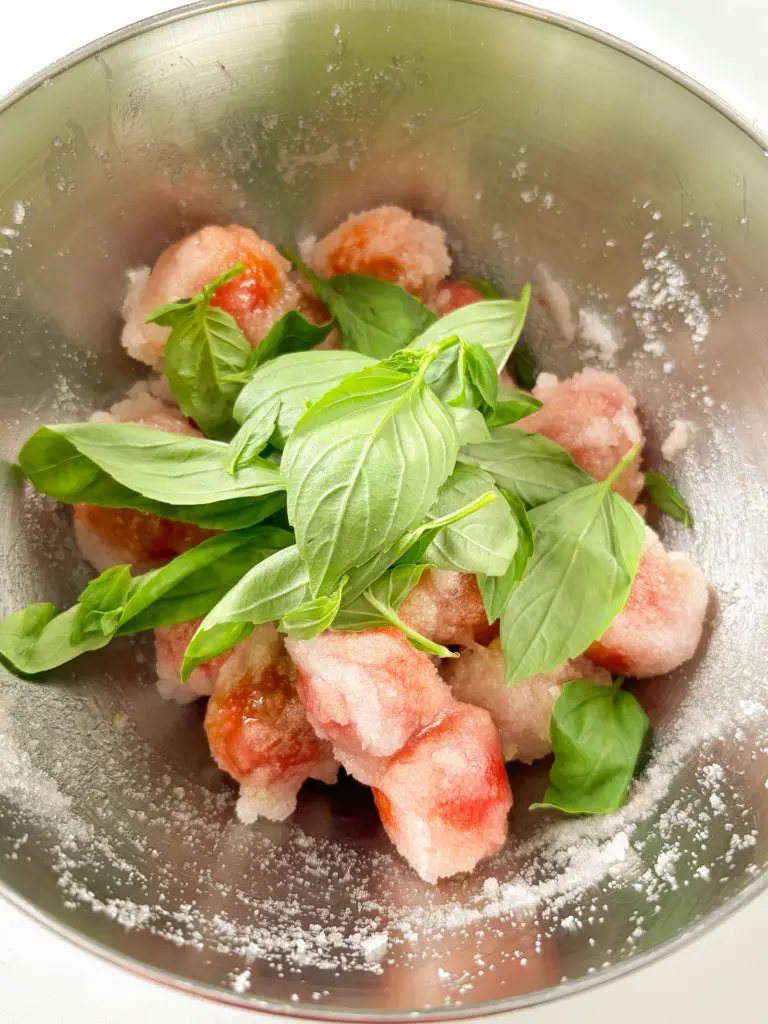
- Leave it at room temperature for 1 day to infuse, then store in the fridge.
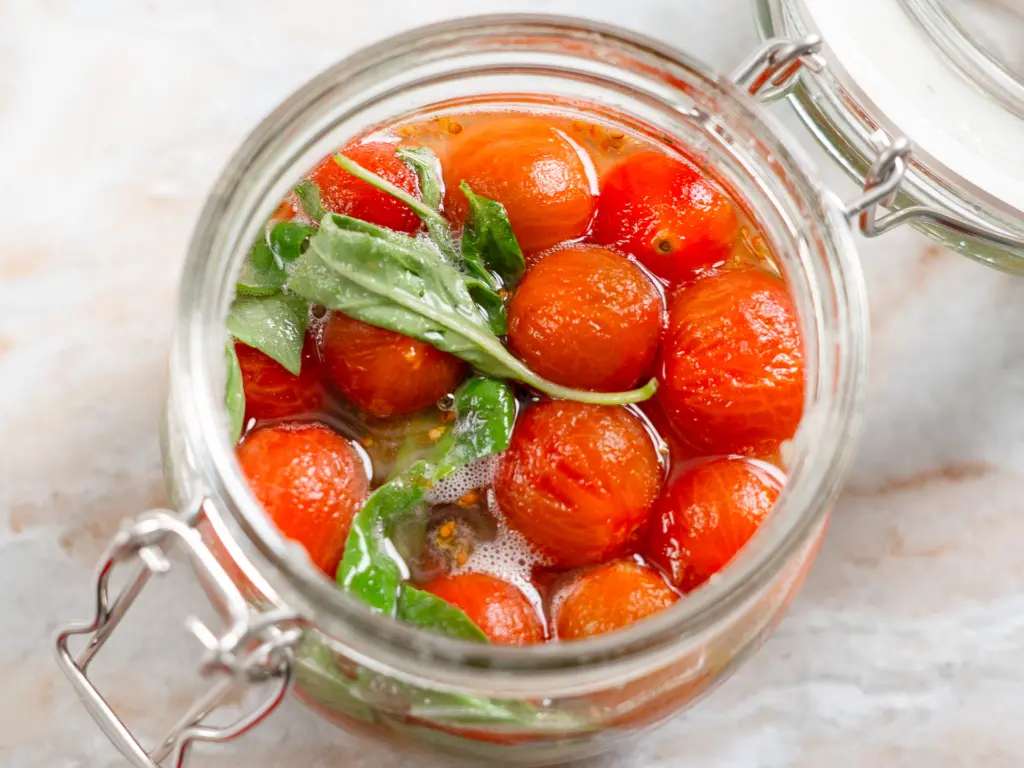
- To serve:1. Fill a cup halfway with ice.2. Add 3 tbsp of basil tomato syrup, 4 cherry tomatoes, 2–3 basil leaves, and 1 cup of sparkling water.3. Stir well.
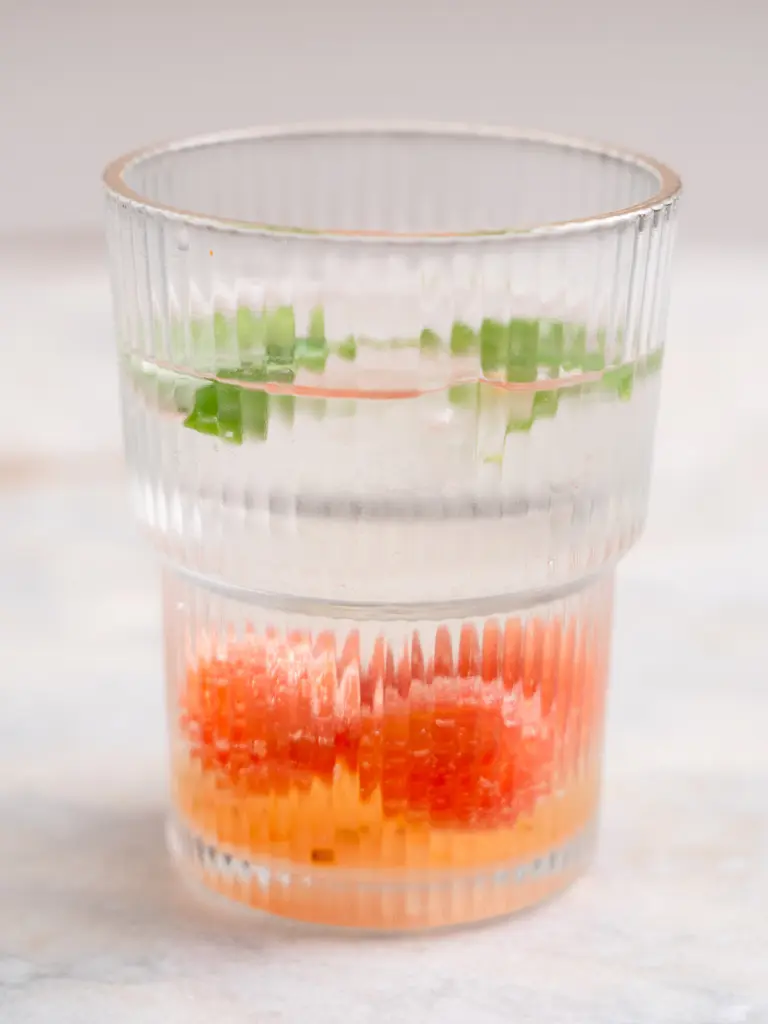
Tomato Basil Ade 토마토 바질 에이드
- Jal Meokgetseumnida! 잘 먹겠습니다!

Did you make this recipe?
Please let me know how it turned out for you! Leave a comment below and tag @blondekimchi_ on Instagram and hashtag it #blondekimchi.
